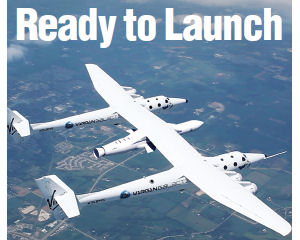Virgin Galactic is flying into the satellite launch business with a new rocket project. The LauncherOne rocket is likely to be built in Mojave, the Antelope Valley desert community that is home to many cutting edge NewSpace companies. It will be carried by the WhiteKnightTwo aircraft and then shot into earth orbit. Test flights of LauncherOne are anticipated in 2015 with commercial service beginning in 2016 at a cost of about $10 million, said Virgin Galactic President George Whitesides. Four companies have signed on to have the rocket carry payloads, or cargo, he added. Virgin Galactic, owned by flamboyant billionaire Richard Branson, enters what space industry experts see as the emerging market to provide a more flexible and less expensive option to carry satellites into space. Unlike ground-based rockets, an aircraft carrying a rocket can get around challenges such as bad weather or access to a launch site. “We don’t have to wait our turn in line,” Whitesides said. “We can launch when the customers want.” With the WhiteKnightTwo already airborne in test flights, Virgin Galactic has a step up on other players in the launch business, notably Stratolaunch, a joint venture between Scaled Composites, Space Exploration Technologies Corp. (Space X) and Dynetics. Stratolaunch, funded by billionaire Paul Allen, is building a hangar facility in Mojave. Providing satellite launches is an extension of Virgin Galactic’s existing NewSpace venture to carry passengers into sub-orbital space aboard the SpaceShipTwo craft. SpaceShipTwo and the WhiteKnightTwo are being built by Mojave-based The Spaceship Company, a partnership between Virgin Galactic and Scaled Composites. The Spaceship Company likely will be the manufacturer of the LauncherOne, Whitesides said. As the program is ramped up, the workforce may see expansion. “This is an exciting business area for the company and there could well be additional staffing requirements,” Whitesides said, though he could not give specifics on how many jobs would be created. Advances in technology make the LauncherOne program possible. Large, bulky satellites no longer monopolize the industry in an era when tight budgets put pressure to achieve a goal at lower cost. Also, technological improvements mean smaller parts can deliver high-resolution imagery and powerful communication links from space. The Atlas and Delta rockets that have for generations taken satellites into orbit are not always needed. “The trend is going to be toward smaller satellites rather than big ones,” said Michael Blades, a senior industry analyst in aerospace and defense with Frost & Sullivan, a business research and consulting firm based in Northern California. “Everything is getting smaller, lighter and more powerful as it shrinks.” Virgin Galactic is targeting this market with the LauncherOne, which will be able to carry satellites up to 500 pounds of cargo. Stratolaunch, by comparison, will carry payloads of 10,000 pounds and heavier. The cargo will be carried in a rocket that’s attached to an aircraft that, when built, will be the largest in the world. Whitesides said the small satellite market is underserved by U.S. companies and Virgin Galactic is ready to fill the demand. “We are teed up to institute a revolution just as we have started one in suborbital flight,” he said. But Virgin Galactic will face some competition as other players are positioned to go after the same customers. Two manufacturers, Sierra Nevada Space Systems, of Sparks, Nev., and Surrey Satellite Technology, based in England, announced they will develop satellite designs optimized to match the LauncherOne. “If there is a growing market, there are companies that will be looking at it,” Blades said. Although the LauncherOne is four years away from commercial flights, customers are already lining up with deposits. The first customers are: Skybox Imaging, a Northern California company backed by venture capital developing satellites to provide photos and video from space; GeoOptics, a Pasadena-based provider of real-time data collected by satellite; Spaceflight Inc., a provider of payload flight services based in Washington state; and Planetary Resources Inc., a Washington state start-up focused on asteroid mining. “We have other deposits and there will be more announcements in the future,” Whitesides said. Partial financing for the rocket program comes from Aabar Investments PJS, an Abu Dhabi investment firm that backs ventures in the aviation, real estate, automotive, and financial industries. Aabar is a current investor in Virgin Galactic. “Virgin Galactic continues to innovate space access, and LauncherOne is a key step in its successful commercialization,” Aabar Investments CEO Mohamed Badawy Al-Husseiny said in a prepared statement. “This development promises to redefine the small satellite market and to promote new research and education opportunities.
